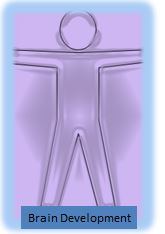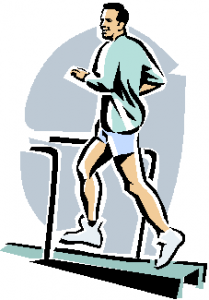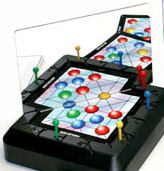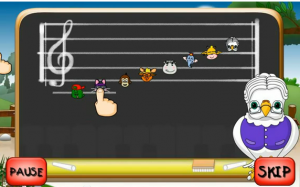Can Mother’s Exercise Boost Baby’s Brain Maturity?
 I regularly get emails from parents asking what they can do to help improve their kid’s brain function and cognitive performance. I offer plenty of tips in the Next Brain blog but am always on the look out for more.
I regularly get emails from parents asking what they can do to help improve their kid’s brain function and cognitive performance. I offer plenty of tips in the Next Brain blog but am always on the look out for more.
For example the New York Times has an interesting article about a research study that suggests as little as one-hour of exercise per week while pregnant can have a pronounced impact on how a new born’s brain processes stimulus.
“their brains were more mature,” Ms. Labonte-LeMoyne said.”
The study cautions that it is not clear if other factors are at play or if the relative advantage will persist as the child develops. The researcher conclude:
“But for now, the lesson is clear. “If a woman can be physically active during her pregnancy, she may give her unborn child an advantage, in terms of brain development,” Ms. Labonte-LeMoyne said. And the commitment required can be slight.”
I am interested to hear about other research studies that examine the impact of exercise (or lack of it) by a mother on her baby’s brain function and cognitive performance.
Categories: Child, Cognitive Development, Parent Tags:
The Impact of Physical Activity on the Brain
 Here in the Next Brain Blog we have reviewed many studies that demonstrate the impact physical activity has on brain function and cognitive performance. For example:
Here in the Next Brain Blog we have reviewed many studies that demonstrate the impact physical activity has on brain function and cognitive performance. For example:
Instant Memory Boost from Six Minutes of Exercise
Tai Chi Boosts Brain Volume and Performance
Exercise Once Weekly Helps Avoid Mental Decline
Short Weekly Walks Improve Intelligence
to list a few. And if that is not enough to convince you to include physical activity as part of your brain training efforts, a review of multiple research studies presented at a recent meeting of the American Association for the Advancement of Science found:
“Dozens of studies now show that aerobic exercise can increase the size of critical brain structures and improve cognition in children and older adults.”
I am interested to hear from readers that use physical activity to improve brain function and cognitive performance. What activities do you do? How frequent do you do them?
Categories: Child, Cognitive Decline, Lifestyle, Memory and Learning, Older Adult Tags: exercise
Early Musical Training Boosts Motor Skills
 An interesting finding for parents looking to accelerated their kid’s brain development:
An interesting finding for parents looking to accelerated their kid’s brain development:
“A study published last month in the Journal of Neuroscience suggests that musical training before the age of seven has a significant effect on the development of the brain, showing that those who began early had stronger connections between motor regions – the parts of the brain that help you plan and carry out movements.”
The study found that the effect is strongest between the ages of 6-8 and that there appears to be no effect in adults.
Interested to hear from readers that are using music as part of their Next Brain development efforts.
Categories: Child, Cognitive Development, Music and Audio, Training Tags:
Using Technology to Supercharge Kid’s Creativity
 Children are naturally creative. Very creative. As parents we want to enhance our kid’s creativity and make sure that it gets carried forward into adulthood. One tool that aspires to do that is the iPad App Toontastic from Launchpad Toys. Kids draw free style and move around a number of characters (e.g. pirates, queens, monkeys) and narrate a story as they play. All the while the App records what they do and compiles it into a cartoon that can be shared online with friends. So far they have 600,000 story tellers from 150 countries that have made more than 2 million cartoons.
Children are naturally creative. Very creative. As parents we want to enhance our kid’s creativity and make sure that it gets carried forward into adulthood. One tool that aspires to do that is the iPad App Toontastic from Launchpad Toys. Kids draw free style and move around a number of characters (e.g. pirates, queens, monkeys) and narrate a story as they play. All the while the App records what they do and compiles it into a cartoon that can be shared online with friends. So far they have 600,000 story tellers from 150 countries that have made more than 2 million cartoons.
While Launchpad Toys does not claim that the App will improve creativity they designed it to do just that. The company argues we are in a creativity crisis by pointing out that creativity scores have been dropping since 1990 (especially in kids 5-12 years old) just when society and the workplace needs innovation the most.
I am interested to hear from readers that are using Apps to improve cognitive performance in kids.
Categories: Child, Problem Solving Tags: creativity
Good Grades are Mostly Determined by Self-Control
 I am often asked by parents what type of skills are critical for success in school. They hear about special programs or techniques for reading, note taking or math skills and want to know if they work. That is why I am always on the lookout for scientific research that probes how the mind’s of high-performing students work.
I am often asked by parents what type of skills are critical for success in school. They hear about special programs or techniques for reading, note taking or math skills and want to know if they work. That is why I am always on the lookout for scientific research that probes how the mind’s of high-performing students work.
For example, recent research on nearly 700 German eighth graders suggests that a student’s level of self-control is the number one factor that determines success. It is more important than memory, general intelligence, verbal ability, mental speed, numerical ability and even creativity. The researchers claim:
“The data show that the most important factor in getting good school grades was the student’s score on psychological tests of self-control. Cognitive ability was the next best predictor of grades, but in fact, it was not a very strong one.”
While not a surprise to readers of the Next Brain Blog, this is an important finding. Delaying gratification, managing procrastination and the ability to structure and manage time are the capacities that students need for success.
I am interested to hear from readers with insights into how to be an effective student. What learning and testing taking skills are critical and how can we develop them?
Categories: Child, Cognitive Development, College Student, IQ and EQ, Memory and Learning, Training Tags:
Bilingual Kids Can Have Mental Advantages
 I get emails from parents interested in hearing about evidence-based ways to improve their children’s brain function and cognitive performance. So I am always on the lookout for scientific studies that suggest Next Brain development ideas for kids. That’s why a university study from Scotland caught my eye. Researchers there found that children speaking two languages (bilingual) can have more mental agility than those that don’t. More specifically:
I get emails from parents interested in hearing about evidence-based ways to improve their children’s brain function and cognitive performance. So I am always on the lookout for scientific studies that suggest Next Brain development ideas for kids. That’s why a university study from Scotland caught my eye. Researchers there found that children speaking two languages (bilingual) can have more mental agility than those that don’t. More specifically:
“Our study has found that it can have demonstrable benefits, not only in language but in arithmetic, problem solving and enabling children to think creatively. We also assessed the children’s vocabulary, not so much for their knowledge of words as their understanding of them. Again, there was a marked difference in the level of detail and richness in description from the bilingual pupils.”
The children in the study were around age nine and the bilinguals spoke Italian and English. It is important to note that they do not claim that learning a second language will produce these cognitive improvements. But is is suggestive.
Interested to hear from readers that live in a bilingual household or that have extensive second language experience. How does it enrich your language skills and thinking abilities?
Categories: Child, Cognitive Development, Problem Solving, Training Tags:
Gift Giving Idea: Consider Fat Brain Toys
 Fat Brain offers an amazing collection of high quality toys and entertainments designed to stimulate the brain and develop cognition. You can shop for toys by gender and ages ranging from 1 year old to 18 years old. From magnetic poetry and brain food (colorful goo) to the best selling stomp rockets and reflections (image shown), a truly unique game that combines mirrors, visual illusion and competition.
Fat Brain offers an amazing collection of high quality toys and entertainments designed to stimulate the brain and develop cognition. You can shop for toys by gender and ages ranging from 1 year old to 18 years old. From magnetic poetry and brain food (colorful goo) to the best selling stomp rockets and reflections (image shown), a truly unique game that combines mirrors, visual illusion and competition.
Just the kind of toys that should be on the holiday shopping list of Next Brain Blog readers. Interested to hear from anyone that has purchased or plays with Fat Brain Toys. How are they making you smarter?
Categories: Child, Cognitive Development, College Student, Mental Focus, Other, Perception, Problem Solving Tags: toys
Will Playing Video Games Boost Kid’s Creativity?
 The answer is yes according to recent research at Michigan State University. They studied 500 12-year-olds and found that playing video games increases creativity when it comes to drawing pictures and writing stories. The finding is robust:
The answer is yes according to recent research at Michigan State University. They studied 500 12-year-olds and found that playing video games increases creativity when it comes to drawing pictures and writing stories. The finding is robust:
“… regardless of gender, race or type of game played by the students, the study found a relation between video game playing and greater creativity.”
They also found no increase in creativity through the use of computers, the Internet or smart phones.
Interested to hear from readers that include video game playing in an effort to develop their children’s brain function and cognitive performance.
Categories: Child, Problem Solving, Software Tags: creativity, games
21st Century Problem Solving Skills for Students
 For more than 25 years Designation ImagiNation has delivered an after school experience that builds creativity, critical thinking and collaborative problem solving skills in k-12 and university level students in more than 30 countries. Students form small teams of 2-7 members, select an open-ended challenge, learn to generate and test creative solutions and then compete in tournaments. They reach over a 100,000 students a year and the tournaments are a significant event. Check out the 2011 global finals. I’ve included a photo (to the right) from the opening ceremonies in this post.
For more than 25 years Designation ImagiNation has delivered an after school experience that builds creativity, critical thinking and collaborative problem solving skills in k-12 and university level students in more than 30 countries. Students form small teams of 2-7 members, select an open-ended challenge, learn to generate and test creative solutions and then compete in tournaments. They reach over a 100,000 students a year and the tournaments are a significant event. Check out the 2011 global finals. I’ve included a photo (to the right) from the opening ceremonies in this post.
Some challenges include:
- Deliver a theatrical performance on the use of solar energy
- Create a movie trailer with characters from at least two nations
- Design and build a wooden and glue structure that can hold a heavy weigh
Here is the pitch:
“By participating in the team-based competitive program, children can achieve lifelong benefits, improve self confidence, and learn the creative problem solving process and develop critical thinking skills.”
There are plenty of opportunities to start a team, sponsor a team or volunteer.
Interested to hear from readers that have participated in the program. How are they teaching creativity and critical reasoning skills?
Categories: Child, Problem Solving Tags:
Cognitive Training uses Music to Boost Verbal IQ
Music is one of the best ways to charge up your cognitive performance in both the short and long term. What differentiates music from noise or other sounds? It is exactly its ability to authentically move our hearts and extend our minds. Music is brain boosting technology by definition. That’s why in the Next Brain blog we are always on the look out for applications that use music to improve brain function or enhance cognitive performance.
 For example, a new study by The Royal Conservatory of Music in Canada, York University and others showed that students 4-6 years old experience a measurable increase in IQ after just 20 days of music-based cognitive training. The improvement showed up in before and after testing and EEG brain imaging.
For example, a new study by The Royal Conservatory of Music in Canada, York University and others showed that students 4-6 years old experience a measurable increase in IQ after just 20 days of music-based cognitive training. The improvement showed up in before and after testing and EEG brain imaging.
The music-based cognitive training included interactive cartoons that delivered lessons twice each day for one hour. A picture of the cartoon is included in this post. To see more watch a video.
While only one study, the results are significant. An impressive 90% of the 48 students in the study show improvement in verbal intelligence after just 40 hours of training. There was a control group and the differences showed up in an EEG that measure functional brain activity. The effects should be long lasting. For more details check out the press release on the Association of Psychological Science web site.
Interested to hear from readers that use music-based training programs.
Categories: Child, Music and Audio, Software, Training Tags: art
